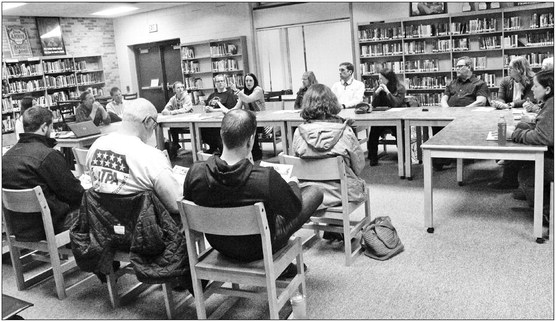Officials defend referendum


Edgar Public School officials and advisory task force members on Monday answered an Edgar retiree worried that he will not be able to afford an April 5 school referendum.
Addressing two dozen people at an informational meeting, Roger Ballerstein said he worried the proposed $950,000 five-year, non-recurring referendum would be a financial burden during a time of inflation. He also said he was concerned that school officials would raise taxes beyond the referendum in order to keep up with rising school bus fuel prices and inflation in general.
District bookkeeper Morgan Mueller said the referendum would stabilize school finances but not raise taxes. She said the school district mil rate would plateau and then drop if the referendum is approved.
Asked for an example, Mueller said current school taxes of $1,230 on a house valued at $130,000 would drop to a projected $946 by the end of an approved five-year referendum.
During the next five years, Edgar School District will pay off a major school remodeling loan. Paying off that loan will lower school taxes.
Mueller said state revenue caps will prevent the Edgar Board of Education from increasing school taxes beyond what the $950,000 referendum authorizes.
The bookkeeper said the district must pay higher costs for all kinds of things, notably employee health insurance, but that doesn’t give the school board the ability to raise taxes.
“We don’t get to say we need more money,” she explained. “We just have to make up the difference” by cutting spending in other areas.
During referendum discussion, Ballerstein criticized Edgar Public Schools as a day care center with a sports program. He said school graduates were unable to make change as retail clerks. He said he felt the school was unsupportable when teachers have told him they must teach to a state performance exam. School officials and task force members strongly defended the public school and argued that without a passed referendum there was no chance to improve school academics.
David Wright, Edgar, a task force member and substitute teacher, said he was impressed with the level of respect students have for teachers and the school climate.
“The level of teaching here will blow your mind,” he said. “From my perspective, the teachers are doing a phenomenal job.” Wright said he was impressed that Edgar students are taught advanced computer skills when he, as a high school student, only was taught how to use a typewriter.
Elementary school principal Dr. Lisa Witt said she was “so proud” of Edgar staff and their dedication to students. She said the school had in place a “pretty rigorous process” of curriculum improvement each year with week-long sessions where teaching goals were refined.
Witt said Edgar curriculum was “based on Edgar” and the needs of local students. She said teachers did not strictly teach to the state’s performance tests. Task force members clarified that much of the cost of sports and other extra-curriculars were not paid by district taxpayers, but by parents and students. District administrator Dr. Cari Guden reported that 2.9 percent of Edgar Public School’s $8 million budget was dedicated to all extra-curriculars. High school principal Tom McCarty said 84 percent of his students participate in extra-curricular activities.
Task force member Michael DeJong, Edgar, said he agreed with Ballerstein’s wish to see enhanced academic learning at Edgar Public Schools.
He said this was a reason to vote for the referendum, not against it.
“If we don’t pass the referendum, we’ll never be able to make the change,” he said.
